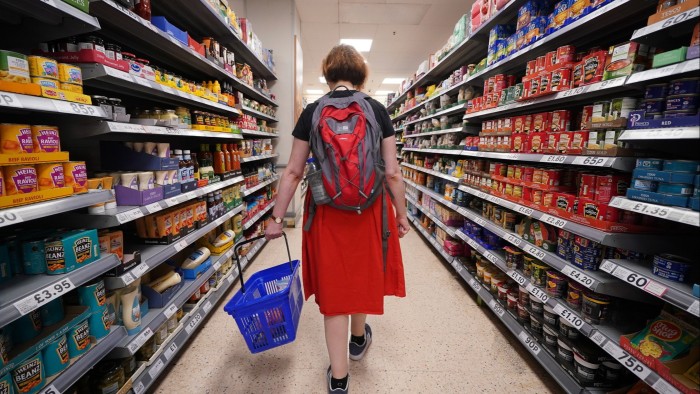Unlock the Editor’s Digest for free
Roula Khalaf, Editor of the FT, selects her favourite stories in this weekly newsletter.
Tesco and Marks and Spencer warned that rising costs and tax increases would affect business this year, sending shares in two of the UK’s biggest retailers lower on Thursday morning.
Shares in M&S fell 6 per cent in morning trading in London, while Tesco dropped 2.7 per cent before a partial recovery, as the sector faces a gloomy economic backdrop and higher taxes after the UK’s Budget in October.
The share prices fell despite Tesco recording its “biggest-ever Christmas” and food sales at M&S growing nearly 9 per cent over the festive period.
M&S warned the outlook for the year ahead remained “uncertain” as the business faced higher costs “from well-documented increases in taxation”. Retailers are facing increased employers’ national insurance bills and a rise in the national living wage.
Both Tesco and M&S warned of higher inflation this year but said they would try not to increase prices. Grocery price inflation rose to 3.7 per cent in December, its highest level since March 2024, according to industry data from Kantar this week.
“We’ll do our best to mitigate the impact,” said Tesco chief executive Ken Murphy as the UK’s biggest retailer maintained its full-year guidance of £2.9bn in retail adjusted operating profit, its preferred metric.
M&S chief executive Stuart Machin on Thursday echoed Murphy’s comments, saying he “absolutely wanted to minimise passing [inflation] through to consumers both in food and in clothing”.
While there was “cautious consumer confidence”, he warned that “cost headwinds are coming our way”.
Finance chief Jeremy Townsend said the retailer would try to “hold our clothing prices as flat as possible” and indicated that it would raise food prices by less than inflation.
Tesco’s Murphy confirmed the retailer would pay an extra £250mn a year in national insurance following the Budget but insisted that Tesco would try not to pass it on to shoppers.
Consumer sentiment was “balanced”, he said, after a year of steady improvement in confidence, although he expected shoppers to focus more on getting value for money in January after Christmas spending.
Tesco’s like-for-like sales, excluding VAT and fuel, rose 3.1 per cent in the 19 weeks to January 4, compared with the same period in the previous year.
Asked about the drop in share price, Murphy said “we don’t read much into it”. Analysts at Jefferies said the supermarket’s decision not to upgrade profit guidance despite a good performance over Christmas was probably “an excess of caution” from the group.
M&S shares fell as much as 6.4 per cent to 352p. This was despite higher than expected like-for-like food sales, which rose 9 per cent in the 13 weeks to December 28. Analysts had expected growth of just under 8 per cent.
“Sales records were broken across the business, with food recording its biggest day and clothing, home and beauty online its biggest week,” said Machin, adding that “core category sales grew strongly as more customers ticked off their whole shopping list at M&S”.
Separately, shares in discount retailer B&M plunged 12.3 per cent on Thursday morning after it reported a fall of 2.8 per cent in like-for-like revenue growth in the UK in its third quarter, compared with the same period in the previous year.
Read the full article here

